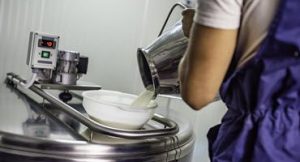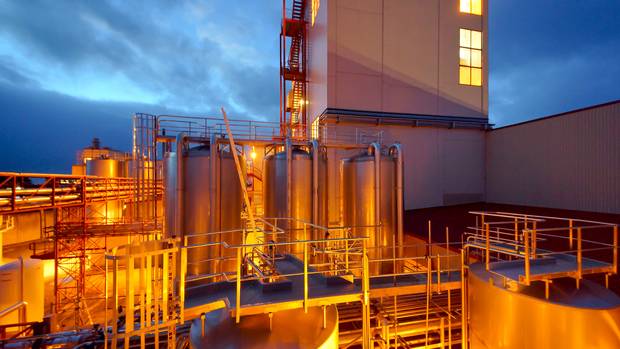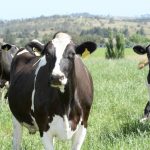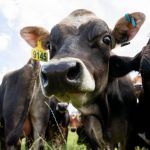
Those optimistic words in 2002 from Westland Milk Products’ then-chairman Ian Robb are now a bittersweet memory. Back then, the dairy co-operative had just rejected joining the newly formed Fonterra. Today, farmers in the rugged, remote region are being asked to sell a nearly 150-year-old dairying heritage to China.
Westland’s farmer-owners this week began gathering in towns up and down the Coast to hear the first pitches from directors to sell their financially-embattled co-op to Asia’s biggest dairy producer, Yili.
There’s little room for sentiment about the old days.
Westland hasn’t been paying its farmers a competitive milk price for several years.
The kitty is stretched, the company is heavily in debt and the banks are breathing down its neck.
In turn, many of Westland’s 429 farmers, still on their knees from the last global milk price slump, are feeling the heat from bankers.
Even if they wanted to – and many don’t – they can’t sell their farms.
Who wants to buy a dairy farm with an income that lags well behind what is being paid to other New Zealand farmers via the industry benchmark, created by market price-setter Fonterra?
To continue to stand alone, Westland would need to gouge “significant” amounts from its already too-skinny milk payouts in the form of retentions.
As chairman Pete Morrison says, that’s just not realistic. “Our farmers can’t afford that.”
Out of the 26 parties who answered the Westland board’s call last year for a white knight with capital, Yili has emerged with the best offer – a buyout deal worth $588 million, including taking on Westland’s debt and liabilities.
According to Westland, the nominal value of its shares has ranged from 70c to $1.50 per share. Yili is offering $3.41 per share, subject to that being within or above an independent adviser’s valuation range. The debt and other assumed liabilities total $342.5m.
For the average-sized Westland supply farm, the share offer translates to about half a million dollars cash.
And there are extra sweeteners in this conditional deal. Yili has committed to collect all milk supply – not to be sneezed at given the remoteness of some West Coast farms.
And it will pay a competitive payout of at least as much as the Fonterra farmgate milk price, for 10 years from the season that starts on August 1 this year.
What that milk price might be is anyone’s guess, but if Fonterra’s and Westland’s respective forecasts for this current season are any indication, it’ll be very hard for struggling farmers to say no.
Fonterra is forecasting that it will pay $6.30-$6.60 per kilogram of milksolids. Westland’s forecast is $6-$6.20. Last season Fonterra paid $6.69, while Westland paid $6.12.
To go ahead, the Yili takeover needs 75 per cent shareholder support and must also be approved by shareholders holding more than 50 per cent of the shares eligible to be voted.
As well as shareholder approval, the deal – formally, a scheme of arrangement – needs High Court approval. It also requires the tick from the Overseas Investment Office (OIO).
Morrison doesn’t anticipate a problem with the OIO. Yili has been in New Zealand since 2013 when it acquired the South Canterbury-based dairy company Oceania. Since then it has invested about $650m in establishing milk powder, infant formula and UHT production lines for Oceania.
But shareholder approval is far from a given despite Morrison’s conviction that “this is a fantastic deal for our farmers”.
Westland is a farmer co-operative. If it is sold, there will be only two dairy co-ops left in New Zealand: Fonterra and Tatua in the Waikato.
They are getting scarcer, but “co-operative” is still a holy word in the dairying lexicon.
Surrendering that status will be a big wrench for the West Coast’s farming stalwarts, particularly given their fierce show of independent pride in voting to stay outside the big industry merger which formed Fonterra.
“It’s bloody sad,” says one industry commentator. “Back then they had money in the bank, a strong balance sheet and they were about to get a cash payment ($84m) for their Dairy Board shares.
“They’ve gone from that to today having no other choice to do what they’ve done. They’ll be incredibly sad to lose their co-operative.”
But the Yili offer provides no more certainty about the future than Fonterra offered back in 2001, says another observer.
He’s surprised the Westland board has opted for a buyout trade sale rather than a joint venture like the Silver Fern Farms model that could have retained the co-operative.
But was that model even on the table? Morrison won’t say.
Nor does he want to discuss the fact that Fonterra approached the Westland board before it began the formal search for new capital.
Fonterra chairman John Monaghan: “We approached the board directly to try to find a co-operative solution for West Coast farmers but we were unable to participate.”
Monaghan says it’s not in the long-term interests of this country’s dairy farmers for the value of New Zealand milk to go overseas.
He notes that farming is a long-term, intergenerational business and Yili’s 10-year milk price commitment “is a relatively short time in farming”.
“The question is what happens to farmers at that point?”
Morrison will only say: “We went through a process. Our key drivers from the beginning were a competitive payout for all our farmers and guaranteed [milk] pickup for all our farmers given some are geographically isolated.
“Anyone involved in the process [who] couldn’t fulfil those criteria weren’t considered.
“We looked at standing alone and going to our shareholders [for capital] and using retained earnings or going to our banks. We looked at a cornerstone investor in the early part and we looked at a full trade sale and that’s what this is.
“This provided the best value and outcome for all our farmers.”
As Federated Farmers vice-president and Fonterra dairy farmer Andrew Hoggard wryly notes, “[Westland] shareholders are being offered money for their shares – Fonterra would’ve been asking them for money [to buy Fonterra shares].”
Hoggard is a strong supporter of the co-operative model but as he says, Fonterra has its own financial issues to overcome right now.
“Are we in a position to let them [Westland] come in at no cost?”
Fonterra jumping in would have been a bad idea, says another industry participant.
Fonterra doesn’t have the money anyway and its farmers wouldn’t be happy about “a sweetheart deal to bail out Westland shareholders”, he reckons.
Poor governance is to blame for Westland’s situation, say most commentators.
In the words of one Westland shareholder, “it is poor governance that’s led them to this position – West Coast people have done it to themselves”.
“They had a very very strong balance sheet when they decided not to join Fonterra but over a period of time and poor governance, they’ve ended up with far too much debt.
“Taking on new milk at $1.50 a share affected all shareholder capital in the company.”
The ANZ bank, New Zealand’s biggest rural lender and, the Herald understands, the West Coast’s main dairy banker, declined to comment.
Westland shareholder Terry Sheridan is a strong critic of the top table.
He points the finger at the board and the past and present executives. “Debt is so great now it’s beyond shareholders.”
For three years now, his farm has been on the market.
But Westland farmers still have a choice, Sheridan says.
“Twenty-five per cent can turn this down. I want to hear the full story. I want to see the details.
“Too many things aren’t clear. We don’t know if our farms are going to be tied in for 10 years. When we sell our farm does it have to be transferred to the new owner?”
Sheridan says an example of Westland’s poor governance is that it has a plant building programme even while it is in debt and searching for a rescuer.
“Nothing should have been done while that was going on but they’re talking about building milk transfer plants and giving farmers more indebtedness than they already had.
“There is no governance.”
Sheridan would have liked Fonterra to have been involved but shareholders were never told about its interest, he says.
Several commentators believe a Yili buyout would crank up the pressure on Fonterra, as milk price setter, to perform.
Morrison has been chairman for three years and a shareholder since 1998.
He doesn’t want to talk about past governance and decisions, including the one to pursue extra milk supply from Canterbury, but to charge only $1.50 for a supply share. And not to retain earnings over the years to strengthen the balance sheet.
“The board and management at the time must have thought it was okay. I don’t want to denigrate the past. We need to deal with the issue we currently have.”
Morrison says his own farm business makes a point of supporting co-operatives, “but they do have trouble raising capital and they need to distribute as much money as possible to their farmer-shareholders.”
He voted in 2001 for Westland to stand alone.
He took on the chairman’s job to “try to help with governance to get a competitive payout”.
“I am a farmer and that’s what I needed along with everyone else.
“But I did say that if I didn’t think we could deliver on that we would be looking at alternative structures so we could get a competitive payout.
“This process has delivered on that 100 per cent.”
Pressed on the quality of Westland’s governance, Morrison says a governance review last year was supported by 93 per cent of shareholders in a vote. The board was reduced from 11 directors to eight.
“It has certainly led to better behaviours in the boardroom.
“This is a tough decision and we haven’t made it lightly. We all understand the ownership issue. I was there when we voted to stand alone and I’m very proud of that.
“But I also want all the farming families here now to be able to have a competitive payout so they can keep their farms.”
The West Coast might lose a co-operative, but dairying there could get a shot in the arm, suggest some observers.
“Westland’s had some horrible years in terms of payout, this should put a bit of confidence back. Also Yili is a huge company – this is a signal of its confidence in dairying and New Zealand,” says one.
Morrison says Yili has indicated that it wants to keep all present management and staff. A committee of five Westland farmers would be the liaison between Yili and suppliers.
While Sheridan doesn’t agree that shareholders have no choice but to accept the deal, he worries about the alternative, which he says is “a black hole”.
Asked what Plan B is if the Yili deal does not come off, Morrison says: “This is a very good plan. We’re going to promote it as hard as we can.”
For Fonterra Shareholders’ Council chairman Duncan Coull, the Westland situation should be a wake-up call to co-operative dairy farmers.
“Farmers need to start seriously considering how we save us from ourselves. We need to start valuing what we have. Companies want to come to New Zealand to share in our provenance story and we seem to be determined to give it away for nothing.”
Or as another dairy farmer puts it: “Public companies will only pay what they have to to get milk and they pay at the co-operative price.
“Look around the world – where there are weak co-operatives, public companies make a lot of money. Where there are strong co-operatives, they don’t.”
























